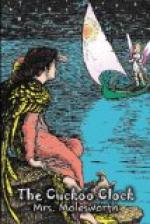“I suppose,” she thought, “he thinks I don’t need amusing, now that the fine days are come and I can play in the garden; and certainly, if I had any one to play with, the garden would be perfectly lovely.”
But, failing companions, she did the best she could for herself, and this was why she loved the path down into the wood so much. There was a sort of mystery about it; it might have been the path leading to the cottage of Red-Ridinghood’s grandmother, or a path leading to fairyland itself. There were all kinds of queer, nice, funny noises to be heard there—in one part of it especially, where Griselda made herself a seat of some moss-grown stones, and where she came so often that she got to know all the little flowers growing close round about, and even the particular birds whose nests were hard by.
She used to sit there and fancy—fancy that she heard the wood-elves chattering under their breath, or the little underground gnomes and kobolds hammering at their fairy forges. And the tinkling of the brook in the distance sounded like the enchanted bells round the necks of the fairy kine, who are sent out to pasture sometimes on the upper world hill-sides. For Griselda’s head was crammed full, perfectly full, of fairy lore; and the mandarins’ country, and butterfly-land, were quite as real to her as the every-day world about her.
But all this time she was not forgotten by the cuckoo, as you will see.
One day she was sitting in her favourite nest, feeling, notwithstanding the sunshine, and the flowers, and the soft sweet air, and the pleasant sounds all about, rather dull and lonely. For though it was only May, it was really quite a hot day, and Griselda had been all the morning at her lessons, and had tried very hard, and done them very well, and now she felt as if she deserved some reward. Suddenly in the distance, she heard a well-known sound, “Cuckoo, cuckoo.”
“Can that be the cuckoo?” she said to herself; and in a moment she felt sure that it must be. For, for some reason that I do not know enough about the habits of real “flesh and blood” cuckoos to explain, that bird was not known in the neighbourhood where Griselda’s aunts lived. Some twenty miles or so further south it was heard regularly, but all this spring Griselda had never caught the sound of its familiar note, and she now remembered hearing it never came to these parts.
So, “it must be my cuckoo,” she said to herself. “He must be coming out to speak to me. How funny! I have never seen him by daylight.”
She listened. Yes, again there it was, “Cuckoo, cuckoo,” as plain as possible, and nearer than before.
“Cuckoo,” cried Griselda, “do come and talk to me. It’s such a long time since I have seen you, and I have nobody to play with.”
But there was no answer. Griselda held her breath to listen, but there was nothing to be heard.
“Unkind cuckoo!” she exclaimed. “He is tricking me, I do believe; and to-day too, just when I was so dull and lonely.”




